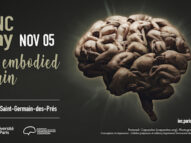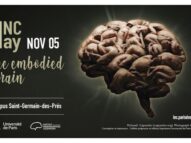videos
INC Day 2020 – Nicolas de Roux – Sex hormones : who determine brain structure and function?
Video of the event (restricted to Paris descartes members).
Continue reading
videos
INC Day 2020 – Valery Grinevich – The oxytocin system in the embodied brain : social touch and communicative behaviors
Video of the event (restricted to University of Paris members).
Continue reading
videos
INC Day 2020 – Catherine Tallon-Baudry – Viscerally conscious (Keynote Lecture)
Video of the event (restricted to University of Paris).
Continue reading
videos
INC Day 2020 – Michel Neunlist – What can the gut nervous system tell us about our brain?
Video of the event (restricted to University of Paris members).
Continue reading
videos
INC Day 2020 – Bryan Gick – How talking stands on posture
Captation et conception vidéo: Service audiovisuel de Paris Descartes.
Video sur MédiasD
Continue reading
videos
INC Day 2020 – Patrick Haggard (UCL, London) – Grounding experience of space and self on skin sensation
Captation et conception vidéo: Service audiovisuel de Paris Descartes.
Video sur MédiasD
Continue reading
events, seminars
November 6, 2020 – Stéphane Dieudonné (ENS, Paris) – A sequential strategy for multi photon actuation and recording of membrane voltage in awake animals
Technologies for recording and manipulating neuronal membrane potential in vivo in defined neuronal populations with high fidelity will be essential to understand how information is represented, processed, and propagated in the brain. Genetically encoded voltage indicators and optogenetic actuators are… Continue reading
events, INC Meetings
November 5, 2020 – INC DAY 2020 – The Embodied Brain
This year the INC DAY will focus on various aspects of the inter-relationship between brain and body: from nutrition and hormones to embodied cognition. Catherine Tallon-Baudry (Ecole Normale Supérieure, Paris) will give the keynote lecture on the topic Viscerally conscious,… Continue reading
events, seminars
October 16, 2020 – Philippe Faure (IBPS, Paris) – Exploratory behavior, individual trait and nicotine addiction: the role of dopamine
Consistent individual differences in behaviours represent an ubiquitous feature in animal populations. These behavioural differences among individuals define personality and have been linked to the susceptibility to addiction. Indeed, the susceptibility to develop drug addiction differs substantially between individuals and some traits that characterize an individual,… Continue reading
events, seminars, videos
October 9, 2020 – Gregory Gauvain (Institut de la Vision, Paris) – Optogenetics for vision restoration: toward clinical trials
Using vector and genetic constructs most suitable for vision restoration in patients with retinopathies, we have demonstrated temporal resolution compatible with highly dynamic visual scenes and a visual acuity above legal blindness.
Captation et conception vidéo: Service audiovisuel de Paris Descartes.
Video sur MédiasD
Continue reading


